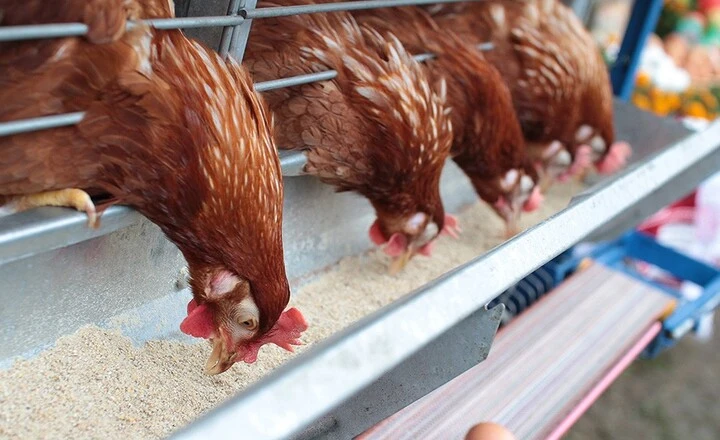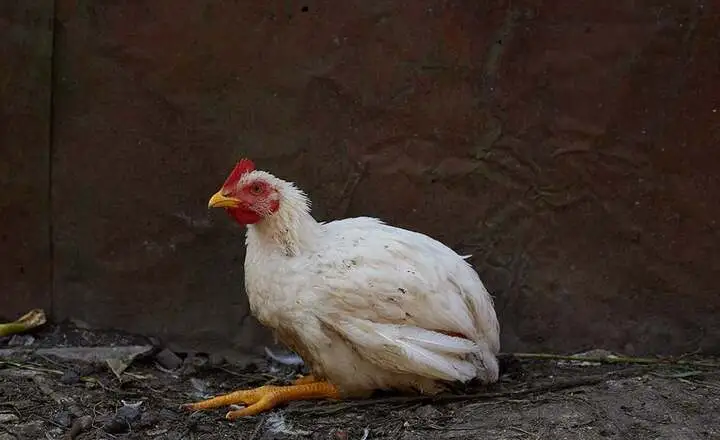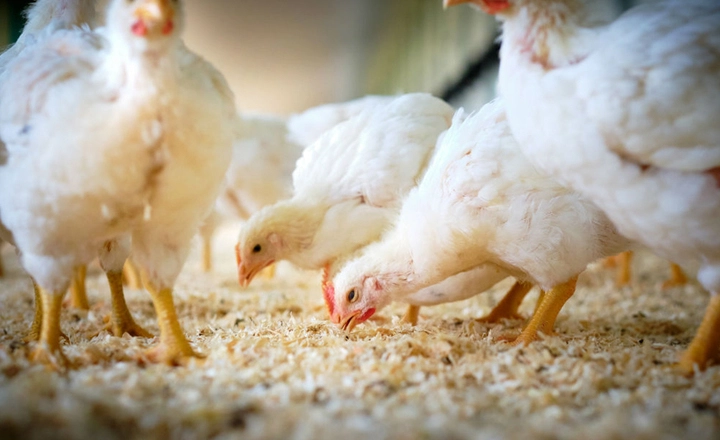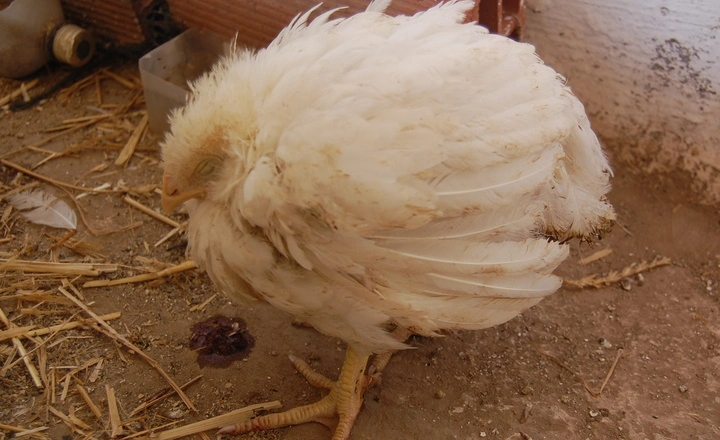Like any other living creature, chickens can fall ill and require treatment. The common ailment in poultry is coccidiosis, a parasitic disease that can wreak havoc on a flock if left unchecked. Enter Corid, the go-to medication for treating coccidiosis in chickens.
But before you rush to administer it to your feathered friends, understanding the correct Corid dosage for chickens is crucial to ensure their health and well-being.
What is Coccidiosis?
It is a common chicken disease caused by multiple species of parasites that multiply rapidly and damage the intestinal lining of chickens.
This leads to a decreased ability to absorb nutrients, which can have serious consequences if left untreated. Poultry farmers must practice good flock management techniques to control and treat coccidiosis effectively.
Chicks are more vulnerable to coccidiosis than older chickens, as they have not yet developed resistance to the disease. Farmers must monitor their flocks closely and take immediate action at the first signs of infection.
Timely treatment and proper management practices are essential in preventing the spread of coccidiosis and ensuring the health and well-being of chickens in a poultry operation.
Symptoms
The key symptom to look out for is a loss of appetite in the affected chickens, as this can indicate an underlying health issue. Dehydration is also a common symptom of coccidiosis, so it’s important to ensure that your chickens have access to clean water at all times.
Diarrhea, droopiness, and the presence of blood or mucus in the feces indicate coccidiosis. Keep an eye out for pale combs and wattles on your chickens, as these can be signs of anemia caused by the parasite.
What is Corid?
Corid is a medication containing the active ingredient Amprolium and is approved by the Food and Drug Administration for use in poultry. It is commonly used to treat coccidiosis, a parasitic disease affecting chickens’ intestinal tract.

Coccidiosis can spread quickly among a flock, so it is recommended to treat the entire group if even one chicken shows symptoms or has been diagnosed with the disease.
Corid Dosage For Chickens
Corid is a commonly used medication for preventing and treating coccidiosis in chickens. The dosage of Corid can vary depending on the severity of the infection and the chicken’s age. A lower dosage is typically recommended for preventative measures, while a higher dosage may be necessary for treating an active infection.
Merial Corid 20% Soluble Powder
When using Merial Corid 20 Soluble Powder for chickens, the recommended dosage is typically 0.012% to 0.024% in the drinking water for prevention of Coccidiosis.
A higher dosage, such as 0.024% to 0.048%, may be needed for treatment purposes. It is important to follow the instructions on the product label and consult with a veterinarian if you are unsure about the correct dosage for your specific situation.
Coccidiosis is a common and potentially deadly disease in poultry caused by parasitic protozoa. Using Corid can be an effective way to prevent and treat this disease in chickens, but it is crucial to use the correct dosage and follow proper protocols to ensure safety and effectiveness.
5-Day Treatment
When treating chickens for Coccidiosis with Corid, following the recommended dosage carefully is essential. The standard dosage for a 5-day treatment is 10 mg per kg of the chicken’s weight.
Mix the appropriate amount of Corid in water and ensure that each chicken receives the correct dosage based on weight.
Consistency in dosing and ensuring that all chickens receive the medication as prescribed is crucial for effective treatment.
21-Day Prevention Plan
The Corid dosage for chickens in a 21-day prevention plan is crucial for preventing Coccidiosis, a common and potentially deadly disease in poultry.
By following the recommended protocol of giving 5 mg of amprolium per kg to the chickens daily for 21 days, you can effectively control and prevent the spread of this disease among your flock. It is important to adhere to this dosage regimen to ensure the health and well-being of your chickens.
Preventative measures such as this plan are essential for maintaining the overall health of your poultry and reducing the risk of disease outbreaks.
Merial Corid 9.6% Oral Solution
The recommended dosage of Merial Corid 9.6 Oral Solution for chickens is typically 1 fluid ounce per gallon of drinking water for prevention purposes. For treatment of active Coccidiosis, a higher concentration may be required, such as 2-3 fluid ounces per gallon.
Treatment Protocol
Mix 16 oz of Corid in 100 gallons of water for a water solution, which can be administered for prevention or treatment through drinking water. If you prefer a drench treatment method, mix 3 oz of Corid per 1 pint of water and administer directly using a syringe.

The recommended dosage for chickens is 1 oz of Corid per 100 lbs, which should be given consistently according to the prescribed schedule.
Prevention Protocol
A typical dosage protocol for prevention involves mixing 8 oz of Corid in 100 gallons of water. This solution can be provided to the chickens regularly to help prevent the occurrence of coccidiosis in the flock.
In cases where individual treatment is needed, a drench treatment can be administered by mixing 1.5 oz of Corid in 1 pint of water. A syringe can give This concentrated solution directly to the affected chicken.
How Do Corid Functions?
Corid mimics the functions of Vitamin B1 and Thiamin in the body. Cocci parasites rely on this vitamin for their survival, growth, and reproduction.
When Corid is administered regularly, it disrupts the parasite’s ability to absorb Vitamin B1, leading to a deficiency that ultimately causes the parasites to die of starvation. This mechanism effectively treats Coccidiosis in chickens when given for 5 consecutive days.
Supplementing the chickens with Vitamin A and Vitamin K during Corid treatment is important to support their overall health and immune system.
By providing these additional vitamins and Corid, you can help ensure that the chickens recover fully from Coccidiosis and maintain their well-being.
Is Corid Safe For Chickens?
It contains the active ingredient Amprolium and is generally considered safe for chickens when used as directed. The FDA has approved it for treating Coccidiosis in poultry, a common and potentially serious intestinal disease.

The medication works by interfering with the growth and reproduction of coccidia parasites in the chicken’s digestive system.
When administered correctly and at the proper dosage, it can effectively treat Coccidiosis in chickens without causing harm.
How Long Does Corid Take To Work?
Corid, a common medication used to treat coccidiosis in chickens, typically starts to show results within 2-3 days of administration. There are cases where it may take a bit longer for the medication to take effect.
If you do not see any improvement within the initial few days, it is recommended to continue with the Corid dosage for up to 5-7 days before considering other options.
If after this extended treatment period there is still no improvement in your chicken’s condition, it is possible that they may be suffering from another underlying disease or health issue.
It is advisable to seek professional advice from a veterinarian then who can provide a more accurate diagnosis and recommend appropriate treatment options.
Is Corid An Anti-biotic?
It contains the active ingredient amprolium, which is not an antibiotic. While amprolium is a drug used to treat coccidiosis in animals, it does not function as an antibiotic. It works by inhibiting the growth of coccidia parasites in the animal’s system.
By allowing some coccidia to remain in the system, Corid helps stimulate the production of antibodies, which can aid in developing resistance against the disease.
It’s important to differentiate between antibiotics and drugs like amprolium when treating animal diseases.
Antibiotics work by killing or inhibiting the growth of bacteria, while drugs like amprolium target specific parasites or pathogens.
Natural Ways To Treat Coccidiosis
If your chickens are suffering from Coccidiosis and the condition is not severe, there are some simple and effective natural remedies you can try. One option is to dilute organic apple cider vinegar with water and give it to the chickens a few times.

This can help improve their condition without the need for expensive medications. Another remedy is to mix a little garlic with yogurt, which can help increase the number of beneficial bacteria in their digestive tract.
Keeping the environment clean and dry can also help prevent Coccidiosis and other diseases. Research-backed natural treatments can be a cost-effective way to manage Coccidiosis in chickens.
Conclusion
Determining the correct Corid dosage for chickens is crucial for effectively treating coccidiosis and preventing the disease’s further spread.
It is important to consult with a veterinarian or poultry expert to ensure the proper dosage based on the infection’s severity and the chickens’ age. Administering too little or too much Corid can negatively affect the birds’ health.
Following recommended guidelines and monitoring the chickens closely during treatment can help them recover and maintain a healthy flock.
FAQs
What happens to chickens with coccidiosis?
It can be fatal for chickens as it can lead to severe dehydration and organ damage. In severe cases, affected chickens may die from the disease.
Can garlic treat coccidiosis?
Garlic is often touted for its potential health benefits, including its antimicrobial properties. Some studies have shown that garlic may be effective against certain types of parasites and infections.
